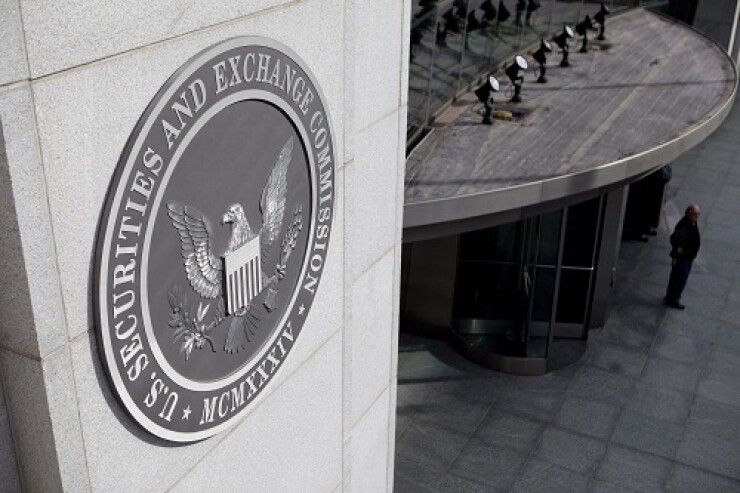
As SEC staffers are
In a live stream of the recent SEC Speaks conference in Washington, Diane Blizzard, associate director for rulemaking at the commission's Division of Investment Management, said that her team is actively developing a recommendation for how a third-party program could work to improve oversight of the RIA sector, following the direction of Chairwoman Mary Jo White, who has repeatedly called for more resources to expand advisor exams.
"This is something we're working on now," Blizzard said. "These reviews would not replace the examinations done by OCIE — they're designed to improve overall compliance by registered investment advisors just by having more touches on some key areas of the regulatory framework by somebody, even if the commission can't get to them as frequently as we would like."
The vision for the third-party advisor exam program, then, appears distinct from the broker-dealer regulatory framework, where FINRA conducts around 80% of the practice exams, according to a source familiar with the SEC's plans in this area.
THIRD-PARTY PRECEDENT
The SEC has said that it has only been able to examine around 10% of the more than 11,000 registered advisors each year. White has appealed to Congress for more funds to enhance the advisor exam program, and some groups have been advocating for legislation that would empower the commission to levy user fees from registrants to fund the exam program.
But Congress has shown little inclination to take up the issue, and the SEC sees the third-party exam initiative as an action it can take on its own.
Blizzard noted that the commission has a precedent for enlisting a third party to help oversee advisors — under the custody rule, advisors who have custody of clients' assets are required to arrange with an outside party for surprise examinations.
But expanding that type of framework to encompass all registered advisors invites a host of other questions, many of which arose more than a decade ago when the SEC floated the concept of third-party RIA exams as it was developing the compliance rule.
"Commenters raised a lot of concerns about the idea, which we're taking into account as we develop the recommendation," Blizzard said. "The costs are a big thing. Some of these advisors are very small, and these reviews — no matter who did them — would be expensive."
Other open questions revolve around what organizations would be qualified to conduct the exams. "How would we judge their expertise? And who would be overseeing them?" Blizzard asked. "We're in the midst of this now, so stay tuned."
Former SEC Commissioner Daniel Gallagher, who recently left the agency, was one of the early advocates of a third-party exam proposal. He said he was pleasantly surprised by the positive feedback that came from some advisory firms who are concerned by the perception that theirs is an industry marked by lax oversight.
At the same time, he is sensitive to the concern that enlisting a third party to conduct practice exams could be an expensive proposition. Might it then make sense to engage an established self-regulatory organization to enter into the advisor sphere?
"How do you tamp down those costs when you're basically deputizing a private party?" Gallagher said. "In thinking through that issue, it occurred to me that if you had an existing SRO (self-regulatory organization) — there's no SRO for advisors, obviously, that's why we're talking about this in the first place — but if you allowed an existing SRO to compete for that business it could really help in the cost-cutting process because it's incremental to them."
Connecting the dots, if an SRO were to delve into advisor exams, the most likely candidate would probably be FINRA, a prospect that groups like the Investment Adviser Association have vigorously opposed, arguing instead for the user-fee framework.
It is far from certain, however, if the commission will be able to set up a third-party exam system before next January, when a new administration will occupy the White House and many of President Obama's high-level appointees are likely to leave government.
MORE EXAMS TARGETED
In the meantime, the SEC has been
Jane Jarcho, associate director of OCIE's investment advisor and investment company exam division, explained the perennial challenge that her organization faces owing to the growth in the RIA sector. Even as OCIE becomes more targeted and efficient in its exams, and even as it adds examiners, the headline statistic — the overall exam rate — holds steady because the number of registered advisors continues to rise.
"What our problem of course is is we don't actually control the number of advisors, so as we are able to do more exams, the number of advisors registering is increasing," Jarcho said. "That means we can never get our coverage up, because if your denominator is increasing by over 500 new registrants each year, it's very difficult to increase coverage. So although the staff in the IAIC program has really, I think, stepped it up, has really [been] doing great exams, the number that the Congress asks a lot about, the coverage number, we're sort of on one of those hamster tracks where we just can't increase the number without more people because of the increase in the registrants."
Read more:





